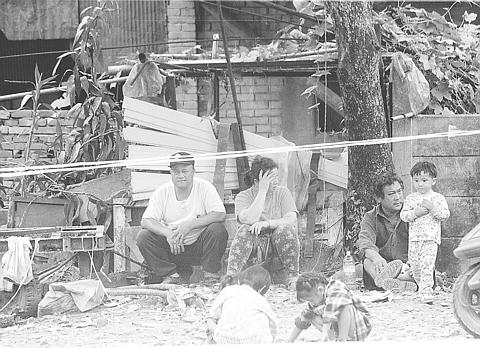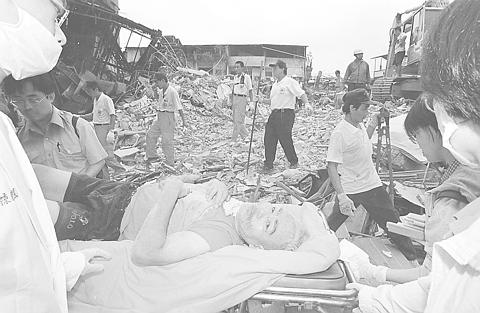As the dust settled in Puli from the worst earthquake in Taiwan this century, the town's many dispossessed residents are slowly coming to terms with the difficult future that awaits them.
Families camped outside their broken and destroyed homes have to deal with not only the fear, shock and trauma from the earthquake, but also the powerful aftershocks that continue to shake the ground around them.
Most have set up camps in open-air spaces, scattered throughout the town, in parks and in schools.

PHOTO: LIN CHENG-KUNG, LIBERTY TIMES
There is really no other place for them to go where they can feel safe, said Liao Yu-chen.
Liao was sitting in the playground of Puli's elementary school yesterday, surrounded by scores of other families facing a similar plight.
"When the quake hit, it felt like the end of the world," Liao said, describing her feelings on the night the earthquake destroyed the town.

PHOTO: CHANG YING-YING, TAIPEI TIMES
Luckily, she was able to get her family out of their home, which split nearly in two.
Now Liao, like many others, is stuck. She cannot return to her destroyed home, but is frightened to leave Puli.
"The roads are terrible -- I wouldn't go anywhere," she said. "Not only that, but aftershocks are a concern."
Just yesterday morning, Liao returned to her home to retrieve a gas cooker. But as she did, an aftershock hit again.
But yesterday, for thousands like Liao, there was a glimmer of hope. Rescue helicopters came and went several by the hour, bringing in food and water and taking away the injured.
Premier Vincent Siew (
They soon discovered that the damage in Puli is much more serious than the government initially estimated.
"It wasn't until 30 hours after the earthquake that we realized the extent of damage that had been sustained," said government spokesman Chen Chien-jen while visiting Puli.
"We were prepared, but in retrospect there was more that could have been done."
He said the government was now focusing on three immediate goals -- an urgent need to handle the bodies of those who lost their lives, shelter and tents for survivors who lost their homes, and for roads to be cleared of debris.
The government has also announced a relief budget of NT$3 billion -- as well as NT$1billion in immediate aid for Nantou, and another NT$1.5 billion for Taichung County.
Chen also said the government would be looking into the structural integrity of the affected buildings to find out why they had collapsed so easily.
Some buildings, he said, were not up to standards, pointing to the fact that many newer buildings had been destroyed.
"Those responsible should be investigated," he said.
At the Taichung veteran's hospital ambulances streamed in, bringing injured people lifted by helicopter from Puli.
A 32-year-old woman, her head wrapped in bandages, said she was in the town of Chongshi when the earthquake struck and the ceiling fell on her.
She was trapped for an hour before being rescued, but had to endure a 10-hour wait before she was taken to a hospital. She said her husband was suffering from exposure
The hospital, a mess on Tuesday as it struggled with the stream of patients, was operating normally yesterday but was packed with the injured.
In neighboring Yunlin County, US search and rescue workers combined their efforts with a local team in Touliu City, about 60km west of Puli, to save people trapped in two toppled buildings.
Workers had made contact with a 33-year old man, Hsu Tse-tai (許澤泰) a novelist, who was stuck beneath what remained of a 16-story building that had sunk five floors when it collapsed on Tuesday.
The workers were able to communicate with him, and had even fed him intravenously, as well as given him oxygen, into the small space within which he was trapped.
Last night his brother came down from Taipei to see if he was okay. There was rescue work going on the other side of the building, but his brother began to move through the rubble to where he thought the apartment would have been.
After some effort, he removed some debris, and started to call out his brother's name, and his brother called back (at 1pm yesterday), and have been trying to get him out ever since. His leg is pinned down by a slab of concrete. At press time last night, rescuers were chipping away at the slab and were confident of freeing him.
International rescue teams began arriving in Taichung yesterday.
Sccording to one member of the USAID team, the help that was being provided was, in his opinion, the best-organized that the group has encountered in its work abroad.
All three of the buildings that collapsed in Touliu were built by the same construction company, which declared bankruptcy over a year ago.
The other building had sunk deep into the ground, and the extremities of the 12-story apartment complex had split open, leaving a huge gaping hole in the middle, exposing metal rebar and concrete.
It was believed that at least four people were still trapped inside a complex that had housed 236 residents. Twenty survivors were pulled out, and another seven bodies were recovered.
But while rescue teams have managed to reach areas like Tou-liu and Puli, some areas remain cut off from the outside.
Aid has come too slowly, said Chung Lin-tong, a farmer who lives in Niomen outside of Puli.
Chung, along with his son came to Puli by motorbike to get milk powder for his newborn eight-month-old child. He and his family are living in their car outside of their country home which is no longer safe to live in. When the earthquake hit, Chung said, he had only one thought, "get my family and get out of the house."

US President Donald Trump yesterday announced sweeping "reciprocal tariffs" on US trading partners, including a 32 percent tax on goods from Taiwan that is set to take effect on Wednesday. At a Rose Garden event, Trump declared a 10 percent baseline tax on imports from all countries, with the White House saying it would take effect on Saturday. Countries with larger trade surpluses with the US would face higher duties beginning on Wednesday, including Taiwan (32 percent), China (34 percent), Japan (24 percent), South Korea (25 percent), Vietnam (46 percent) and Thailand (36 percent). Canada and Mexico, the two largest US trading

ACTION PLAN: Taiwan would expand procurement from the US and encourage more companies to invest in the US to deepen bilateral cooperation, Lai said The government would not impose reciprocal tariffs in retaliation against US levies, President William Lai (賴清德) said yesterday, as he announced five strategies to address the issue, including pledging to increase Taiwanese companies’ investments in the US. Lai has in the past few days met with administrative and national security officials, as well as representatives from various industries, to explore countermeasures after US President Donald Trump on Wednesday last week announced a 32 percent duty on Taiwanese imports. In a video released yesterday evening, Lai said that Taiwan would not retaliate against the US with higher tariffs and Taiwanese companies’ commitments to

‘SPECIAL CHANNEL’: Taipei’s most important tasks are to stabilize industries affected by Trump’s trade tariffs and keep negotiations with Washington open, a source said National Security Council Secretary-General Joseph Wu (吳釗燮) arrived in the US for talks with US President Donald Trump’s administration, a source familiar with the matter said on Friday. Wu was leading a delegation for a meeting known as the “special channel,” the Financial Times reported earlier. It marked Trump’s first use of the channel since returning to the White House on Jan. 20. Citing a source familiar with the matter, the Financial Times reported that Minister of Foreign Affairs Lin Chia-lung (林佳龍) was also a part of the delegation. The visit came days after China concluded war games around Taiwan and amid Trump’s

CHIP EXCEPTION: An official said that an exception for Taiwanese semiconductors would have a limited effect, as most are packaged in third nations before being sold The Executive Yuan yesterday decried US President Donald Trump’s 32 percent tariff on Taiwanese goods announced hours earlier as “unfair,” saying it would lodge a representation with Washington. The Cabinet in a statement described the pledged US tariffs, expected to take effect on Wednesday next week, as “deeply unreasonable” and “highly regrettable.” Cabinet spokeswoman Michelle Lee (李慧芝) said that the government would “lodge a solemn representation” with the US Trade Representative and continue negotiating with Washington to “ensure the interests of our nation and industries.” Trump at a news conference in Washington on Wednesday announced a 10 percent baseline tariff on most goods